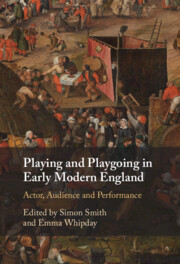Book contents
- Playing and Playgoing in Early Modern England
- Playing and Playgoing in Early Modern England
- Copyright page
- Contents
- Illustrations
- Notes on Contributors
- Acknowledgements
- A Note on the Text
- Introduction
- Part I Players
- Chapter 1 Shakespeare’s Motists
- Chapter 2 ‘Thou Look’st Pale’: Narrating Blanching and Blushing on the Early Modern Stage
- Chapter 3 Emotions, Gesture, and Race in the Early Modern Playhouse
- Chapter 4 The Girl Player, the Virgin Mary, and Romeo and Juliet
- Part II Playgoers
- Part III Playhouses
- Bibliography
- Index
Chapter 4 - The Girl Player, the Virgin Mary, and Romeo and Juliet
from Part I - Players
Published online by Cambridge University Press: 10 March 2022
- Playing and Playgoing in Early Modern England
- Playing and Playgoing in Early Modern England
- Copyright page
- Contents
- Illustrations
- Notes on Contributors
- Acknowledgements
- A Note on the Text
- Introduction
- Part I Players
- Chapter 1 Shakespeare’s Motists
- Chapter 2 ‘Thou Look’st Pale’: Narrating Blanching and Blushing on the Early Modern Stage
- Chapter 3 Emotions, Gesture, and Race in the Early Modern Playhouse
- Chapter 4 The Girl Player, the Virgin Mary, and Romeo and Juliet
- Part II Playgoers
- Part III Playhouses
- Bibliography
- Index
Summary
This chapter demonstrates that girls were active participants in early English dramatic cultures. It reveals girls performing everything from medieval religious plays to Tudor civic pageants to the Stuart court masques. Challenging long-held assumptions about when girls took to the stage, it surveys the evidence of the girl player, including payment for girl performers, eye-witness accounts of girl performers, stage directions that call for girls, paintings that depict girls performing, and plays and masques explicitly composed for girls. It charts the specific history of girls performing in plays about the Virgin Mary in England and in France, and finally turns to Romeo and Juliet, revealing how Shakespeare consistently draws on Marian themes in his characterization Juliet, engaging with as well as memorializing a longstanding dramatic tradition of the girl player that had recently been suppressed by the Reformation.
- Type
- Chapter
- Information
- Playing and Playgoing in Early Modern EnglandActor, Audience and Performance, pp. 77 - 98Publisher: Cambridge University PressPrint publication year: 2022

